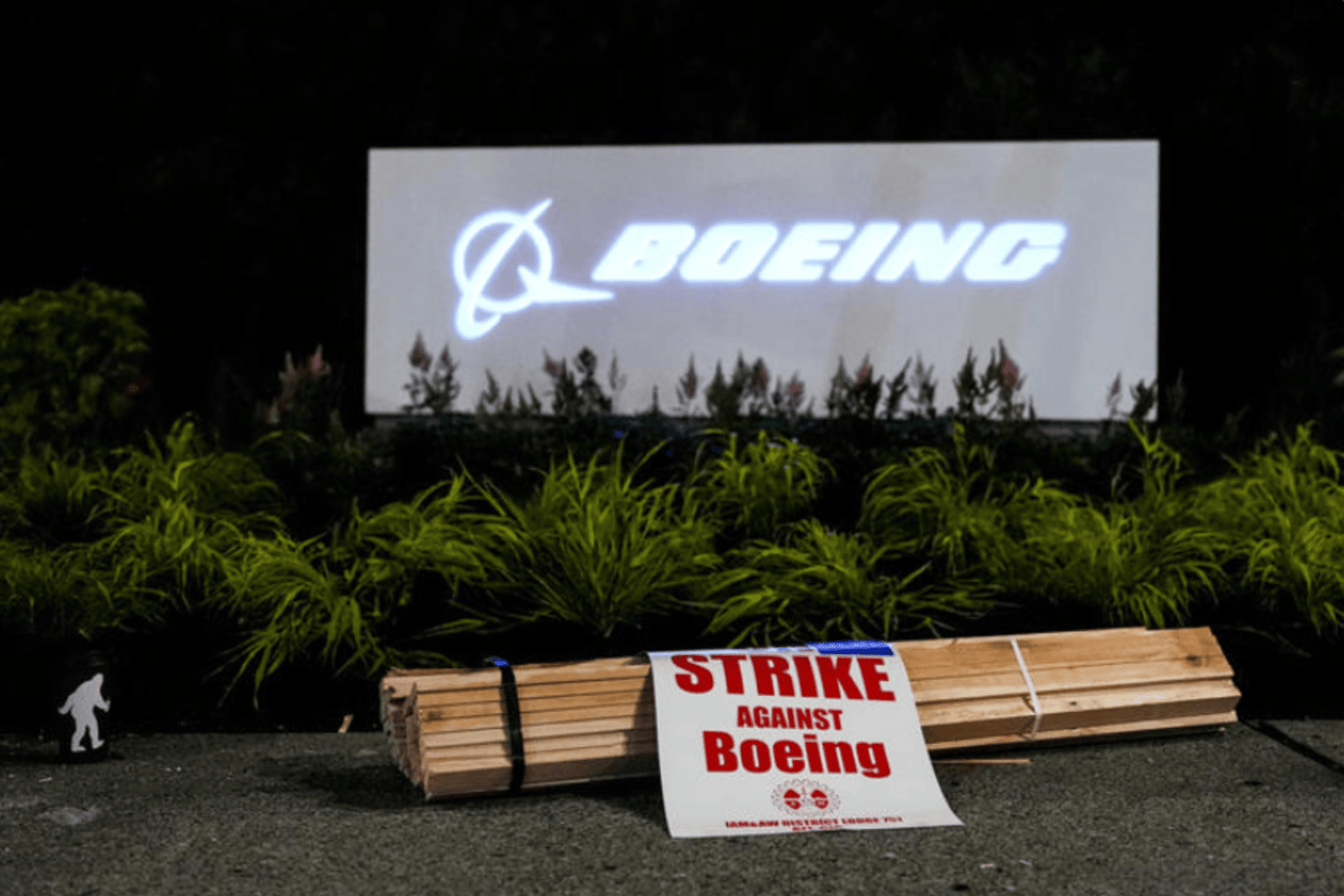
Boeing Strike Crisis: 5 Major Industry Impacts . Strike Hits Boeing Production: What It Means for the Industry
Overview of the Strike
A major strike has started at Boeing. Around 33,000 machinists are on strike. This labor action affects the company’s production lines. Workers began picketing at Boeing facilities on Friday. They rejected a contract offer. The union had negotiated and endorsed the offer, but it was not accepted. Boeing Strike Crisis: 5 Major Industry Impacts
The recent strike involving Boeing’s machinists marks a significant labor action in the aerospace industry. Approximately 33,000 workers have walked off their jobs, leading to a widespread work stoppage at several key Boeing facilities.

The affected facilities are primarily located in Washington, Oregon, and California, which are crucial to Boeing’s production network. These models are critical to Boeing’s lineup, with the 737 Max being one of its best-sellers. The halt in production is centered at Boeing’s main plants in Renton and Everett, Washington, near Seattle, which are responsible for assembling these key aircraft.
Despite the scale of the strike, its immediate effect on commercial flights is limited. Airlines that currently operate Boeing aircraft will continue their schedules with existing fleets. The strike does not directly affect planes that are already in service or those under repair. However, the longer-term impact could be more profound, potentially leading to delays in new aircraft deliveries and disruptions in the production pipeline.
Production Halt
The strike has caused a halt in Boeing’s production. Production for these planes is stopped. The 737 Max is Boeing’s top-selling airliner. These planes are made in Renton and Everett, Washington. These are key production sites near Seattle.
Impact on Commercial Flights
Currently, the strike will not immediately impact flights. Existing planes will still operate. Airlines can continue flying with their current fleet. The immediate effect on commercial flights is minimal.
Potential Long-Term Effects
The long-term effects could be significant. Boeing’s production delays will likely lead to financial losses. The company already faces financial struggles. Production halts can worsen these issues. They can lead to delays in plane deliveries.
Effect on the 787 Dreamliner
The strike does not affect the Boeing 787 Dreamliner. This model is built in South Carolina. The workers in South Carolina are not part of the strike. Thus, production of the 787 Dreamliner will continue as planned. Airlines that rely on this model will not face delays due to the strike.
Company’s Financial Struggles
Boeing has been dealing with financial issues for some time. The company’s financial struggles are well-documented. The strike adds to the challenges. Boeing is already grappling with a battered reputation. Delays and production halts can increase financial pressure on the company.
Impact on Supply Chains
The strike affects Boeing’s supply chain. Suppliers may face delays in receiving components. This can impact their operations. Delays in the supply chain may ripple through the industry.
Negotiations and Future Outlook
Negotiations are ongoing between Boeing and the union. The outcome of these talks will determine the strike’s duration. Until then, Boeing’s operations remain at a standstill. The future outlook depends on the effectiveness of negotiations.
Industry-Wide Implications
The strike has broader implications for the aerospace industry. It highlights the challenges in manufacturing and labor relations. Other companies may face similar issues. Long-term solutions are needed to prevent future disruptions.
The Boeing strike reverberates beyond the confines of the company itself, influencing the entire aerospace industry. This labor action highlights broader challenges within the sector, particularly around labor relations and production stability. When such a large player in the aerospace field halts production, it creates ripples that extend through the supply chain and affect other industry stakeholders.
First, the strike underscores the growing tension between labor and management in manufacturing industries. As the aerospace sector becomes increasingly reliant on complex, high-value production, the stakes for both workers and companies are higher. Disputes over wages, working conditions, and job security are becoming more common, reflecting broader economic and social shifts. This situation places a spotlight on how major corporations handle labor negotiations and the potential for significant disruptions when agreements are not reached.
Second, the strike impacts the supply chain significantly. Boeing’s extensive network of suppliers and subcontractors faces delays and uncertainties as production lines pause. Components meant for Boeing’s halted models, like the 737 Max and 777, are delayed or left in limbo. This disruption can lead to financial strain on smaller suppliers, some of whom may be dependent on Boeing contracts for their viability.
Moreover, the strike can affect global airlines that rely on Boeing aircraft. Airlines facing delayed deliveries may have to adjust their schedules, potentially leading to operational inefficiencies. They might also experience financial repercussions if they are unable to expand their fleets as planned or face increased costs for interim solutions.
The broader implications for the aerospace industry also include potential shifts in market dynamics. Competitors may see an opportunity to capture market share while Boeing is incapacitated. This could lead to increased competition and pressure on Boeing to resolve the strike swiftly to regain its market position.
Overall, while the immediate effects are concentrated, the industry-wide ramifications of the strike are profound and multifaceted, influencing labor relations, supply chains, and market competition.
Conclusion
The Boeing strike marks a critical moment for the company. While immediate effects on flights are limited, the strike’s impact on production and finances could be substantial. The situation remains fluid. As negotiations continue, the aerospace industry watches closely. The resolution of this strike will be crucial for Boeing and its partners.







